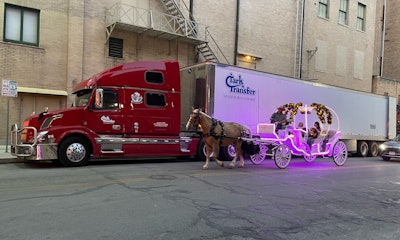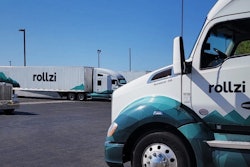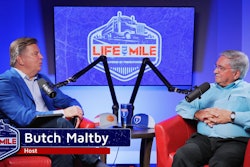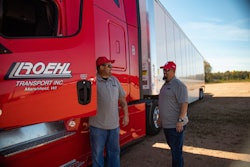
CCJ Innovators profiles carriers and fleets that have found innovative ways to overcome trucking’s challenges. If you know a carrier that has displayed innovation, contact CCJ Chief Editor Jason Cannon at [email protected] or 800-633-5953.
Charlie Deull, part of the family that owns and operates the Broadway show-related freight carrier Clark Transfer, experienced the COVID-19 pandemic as an existential business threat. He watched as, quite literally overnight, the entirety of the touring-theater business came an abrupt halt, sidelining a then around 100-unit fleet made up entirely of leased owner-operators.
With around 20% of those 100 trucks helmed by teams, Clark Transfer's roughly 125 total contracted owner-operators were often dedicated to touring shows for months, even years at a time. The company then owned a fleet of 340 or so trailers “custom-designed for entertainment” industry hauling, Deull said. “In the span of about 36 hours” in 2020, then, “all the shows unloaded into about 225 of our trailers. Work stopped,” and life hung in the balance for the entire company and the businesses it supports.
Clark shifted to hauling general freight to an extent, but continued to compensate “those doing general freight like they were doing show work,” Deull said, borrowing money and, ultimately, running losses through it all. “We lost a bunch of money until show business started back up.”
A lot of their leased owner-operator core, too, moved on to other things. When Broadway began to return in earnest the fleet was essentially half its pre-pandemic size, and efforts to recruit were stymied by a mixture of a booming spot market and the reality that Clark’s business, though above-average in owner-op compensation, is below average when it comes to home time and other creature comforts given the touring nature of its freight.
“While we will always get somebody home when they say they need to be” for the most part, Deull said, “it can’t be every week.” Two months, 10 days advance notice, “we can do that.” But it’s just “not compatible with every week, every two weeks. That’s not how touring shows work.”
The company did not want to shift to a powered-equipment-purchasing operation and hire company drivers, as “we for years have believed that the people who made this all happen are amazing owner-operators,” Deull said. Clark, rather, adjusted its leased-owner compensation structure to provide a backstop it believed would add a measure of income security that would be particularly attractive to business owners whose memory of the pandemic was fresh.
The move was an innovation few carriers in trucking have been willing or able to make.
“We started an actual guarantee program,” Deull said, a model that among leased owner-operators is very uncommon indeed. CCJ sister publication Overdrive’s last owner-op compensation survey found just 4% of leased owners reported any kind of guaranteed backstop in their leasing fleet’s compensation structure, though minimum weekly and monthly, sometimes annual salary, guarantee programs are increasingly common for company driver compensation.
In terms of recruiting and orienting new owner-operators to the business, the family behind Clark Transfer prides itself on being above-board, with an intent in a perfect world to “under-promise and over-deliver” when it comes to compensation. Owner-operators too often, Deull said, “have been lied to at so many places before. My mother had three rules growing up – never lie, do what you say you’re going to do, and never be late.”
The minimum-guarantee structure – $3,500 weekly for solo operations, $5,000 for teams – Deull said is a “way of putting our money where our mouths are” when it comes to the promise of revenue achievable leased to the company.
The company’s average leased solo owner grosses between $175,000 and $200,000 annually on just 80,000 or so miles, an average team $225,000-$300,000 on just 110,000 miles, the company states in a document that fully spells out the program for leased owners.
Whether an owner qualifies for the minimum guarantee is based on a calculation for owners at the end of every quarter to arrive at the owner’s average weekly settlement for that quarter. First, the number of days worked is divided by seven to come up with the number of weeks worked that quarter – total revenue for the quarter is then divided by the weeks figure to compute the average. If that number is less than 3,500 (5,000 for teams), Clark pledges to make up the difference for all weeks.
Given the big return since late Fall 2021 of Broadway touring business, though, Deull said in early May when we talked about the program, for leased owners who’ve been fully integrated into the company’s operation for some time the minimum guarantee had not applied for a single one. Yet where it had come into play was among newly leased owners, compensating their very first weeks with the company as they get their footing within the system.
Previously, “in a normal cycle,” Deull said, it wouldn’t be before the third weekly settlement check that revenue would even begin to reflect over-the-road realities. Now, for the first four weeks of a leased owner or team’s time at Clark, the guarantee applies no matter what. This has been “extremely popular” among owners, he added, since making that switch in late Spring/early Summer retroactive to the beginning of the year.
The change, too, is “actually costing us money,” Deull said. “It’s expensive, but worth it” for the commitment it shows to building the foundation of the business partnership. "We are getting strong traction now on recruiting."
With the structural change in the guarantee, Clark this year has temporarily instituted quarterly bonuses for all leased owners that amount to $10,000 annually per operator – a way to better share, Deull felt, with operators the fruits of Broadway freight’s return.
Another new, more structural commitment, too, though, is a change in fuel-surcharge compensation. Clark’s surcharge paid to its contractors is tied to miles run and based on $1.40/gallon at 6 mpg. As fuel costs rise, operators averaging lower fuel mileage may ultimately pay well more than $1.40 out of pocket for fuel. The company now pledges that no one, regardless of fuel mileage, will pay out more than $1.60/gallon. As with the minimum revenue guarantee, “we’ll do the math at the end of the quarter and make sure,” Deull said. “This one will cost us some money,” too. “We will end up paying something to the lower-efficiency operators, but we’re not concerned from an equity standpoint,” given there are plenty of incentives still in place for all to work toward better efficiency to keep and make more money.
The surcharge is also set to be paid not just on loaded miles, but all dispatched miles, whether bobtail, empty and/or loaded.
Those two structural changes have delivered an uptick in new owners reaching the company and, if Deull’s right, will better cement relationships with those new owners for the long term.
“After losing half the fleet,” he said, “we feel like we’ve got a pipeline” of committed owner-operators incoming “that’s in good stead. It’s hard to put a finger on any one piece of this that’s starting to work or will work, whether it’s conditions in general freight, whether we’re reaching people better, or whether it’s this combination of new things” aimed at better backstopping revenue to mitigate unforeseen circumstances.
One thing’s certain in his view: “The group of programs collectively” do in fact better “communicate our attitude – a belief in the importance of the owner-operator” to the present and future of Clark Transfer.
The CCJ Innovators program is brought to you by Comdata, Freightliner Trucks, Omnitracs and Valvoline.











